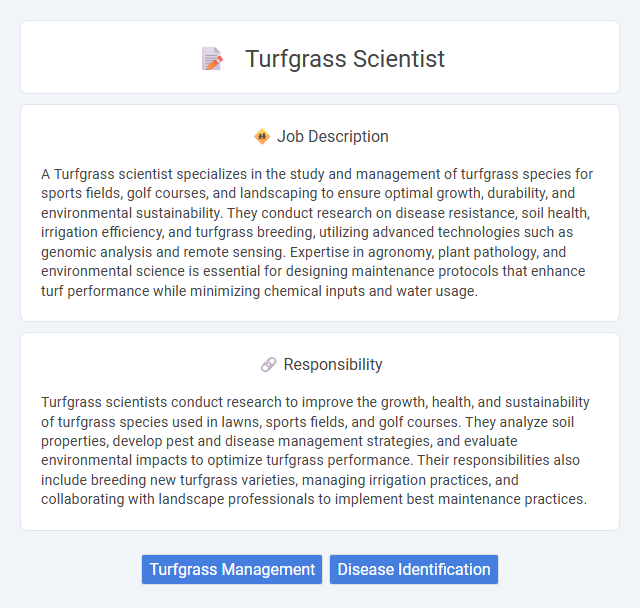
A Turfgrass scientist specializes in the study and management of turfgrass species for sports fields, golf courses, and landscaping to ensure optimal growth, durability, and environmental sustainability. They conduct research on disease resistance, soil health, irrigation efficiency, and turfgrass breeding, utilizing advanced technologies such as genomic analysis and remote sensing. Expertise in agronomy, plant pathology, and environmental science is essential for designing maintenance protocols that enhance turf performance while minimizing chemical inputs and water usage.
Individuals with a strong interest in plant biology, environmental science, and outdoor work are likely suitable for a turfgrass scientist role. Those who prefer routine office jobs or have limited tolerance for fieldwork and varying weather conditions may find this position less compatible. It is probable that candidates with attention to detail and patience for long-term research will excel in this profession.
Qualification
A Turfgrass scientist requires a strong background in plant science, agronomy, or horticulture, often holding a bachelor's or master's degree in these fields. Expertise in soil science, pest management, and environmental sustainability is essential for effective turfgrass research and maintenance. Proficiency in data analysis and field experiment design enhances the ability to develop innovative solutions for turfgrass improvement and management.
Responsibility
Turfgrass scientists conduct research to improve the growth, health, and sustainability of turfgrass species used in lawns, sports fields, and golf courses. They analyze soil properties, develop pest and disease management strategies, and evaluate environmental impacts to optimize turfgrass performance. Their responsibilities also include breeding new turfgrass varieties, managing irrigation practices, and collaborating with landscape professionals to implement best maintenance practices.
Benefit
Turfgrass scientists likely experience benefits such as contributing to sustainable landscape management and enhancing environmental quality through improved grass varieties. Their work probably leads to advancements in drought-resistant and disease-resistant turf, which may increase job satisfaction and career stability. Employment in this field often offers opportunities for collaboration with academic institutions and industry stakeholders, potentially providing professional growth and research funding.
Challenge
Turfgrass scientists likely face challenges related to balancing the demand for aesthetically pleasing lawns with environmental sustainability concerns. They probably contend with issues such as pest resistance, climate variability, and water conservation while developing resilient grass varieties. The complexity of integrating advanced research with practical turf management strategies may also present ongoing difficulties in their work.
Career Advancement
Turfgrass scientists specialize in the study and management of turfgrass species, playing a crucial role in sports turf, golf courses, and landscape maintenance. Career advancement often involves progressing from research assistant to roles such as senior agronomist, turfgrass extension specialist, or director of turf management programs. Expertise in biotechnology, soil science, and pest management enhances opportunities for leadership positions and influence in environmental sustainability initiatives within the turfgrass industry.
Key Terms
Turfgrass Management
Turfgrass scientists specializing in Turfgrass Management conduct research on grass species, soil conditions, and environmental factors to improve turf quality on sports fields, golf courses, and landscapes. They develop sustainable maintenance practices including mowing, irrigation, fertilization, and pest control to enhance turf health and durability. Expertise in plant physiology, soil science, and integrated pest management is essential for optimizing turf performance under varying climatic conditions.
Disease Identification
Turfgrass scientists specializing in disease identification utilize advanced diagnostic techniques to detect fungal, bacterial, and viral pathogens affecting turfgrass health. They conduct field assessments and laboratory analyses, integrating molecular tools such as PCR and microscopy to accurately identify disease agents. Their expertise supports the development of effective management strategies to mitigate turfgrass diseases and enhance turf quality in sports fields, golf courses, and landscapes.
 kuljobs.com
kuljobs.com